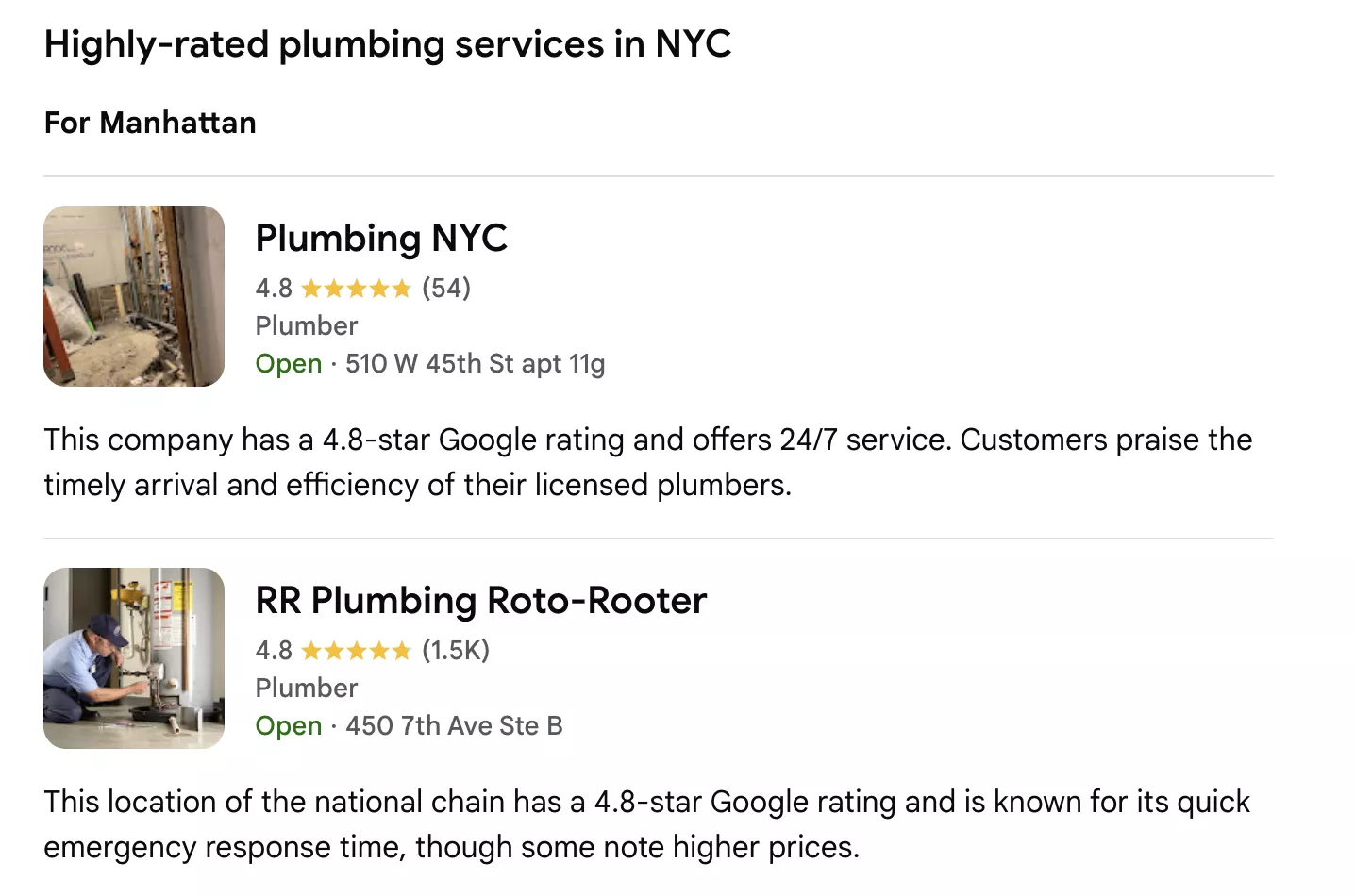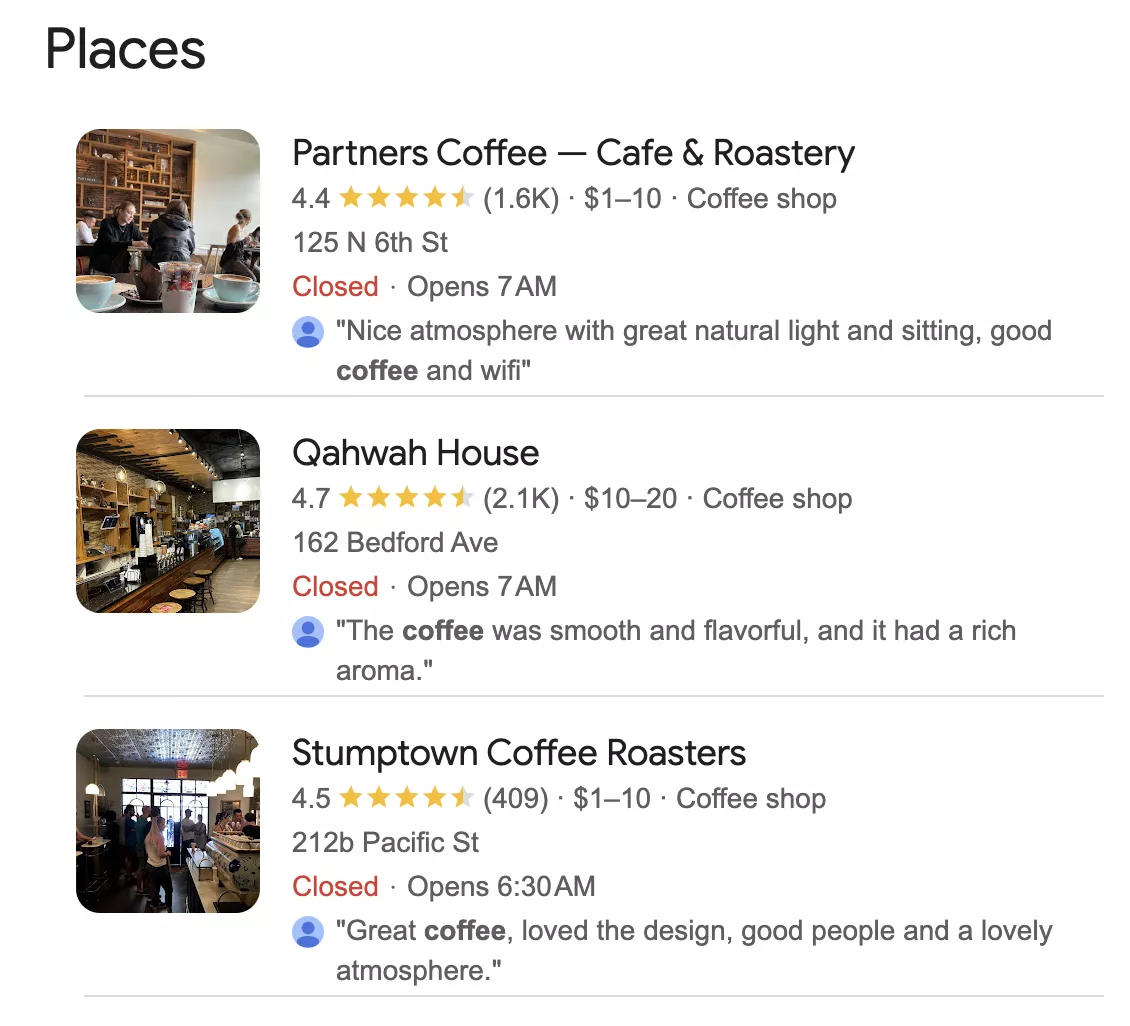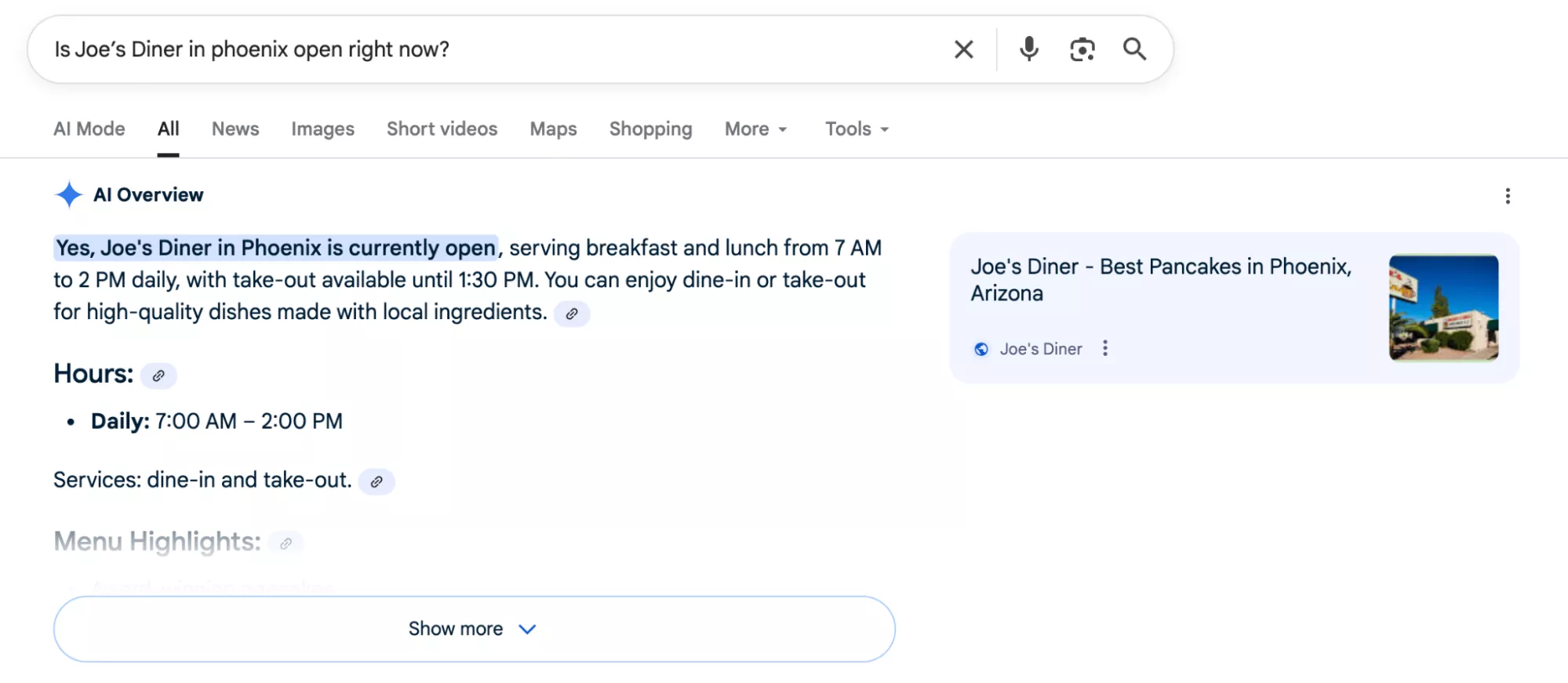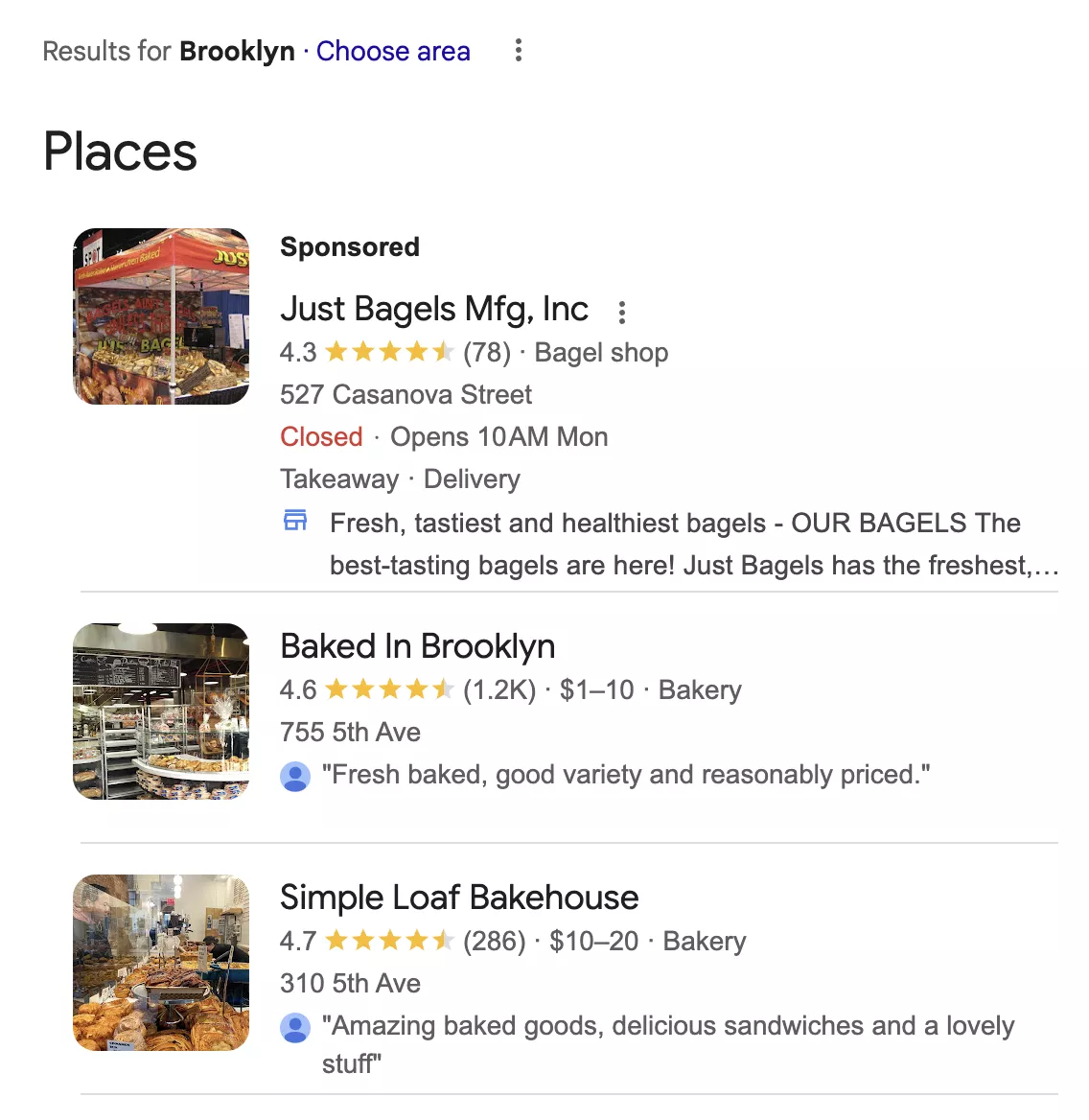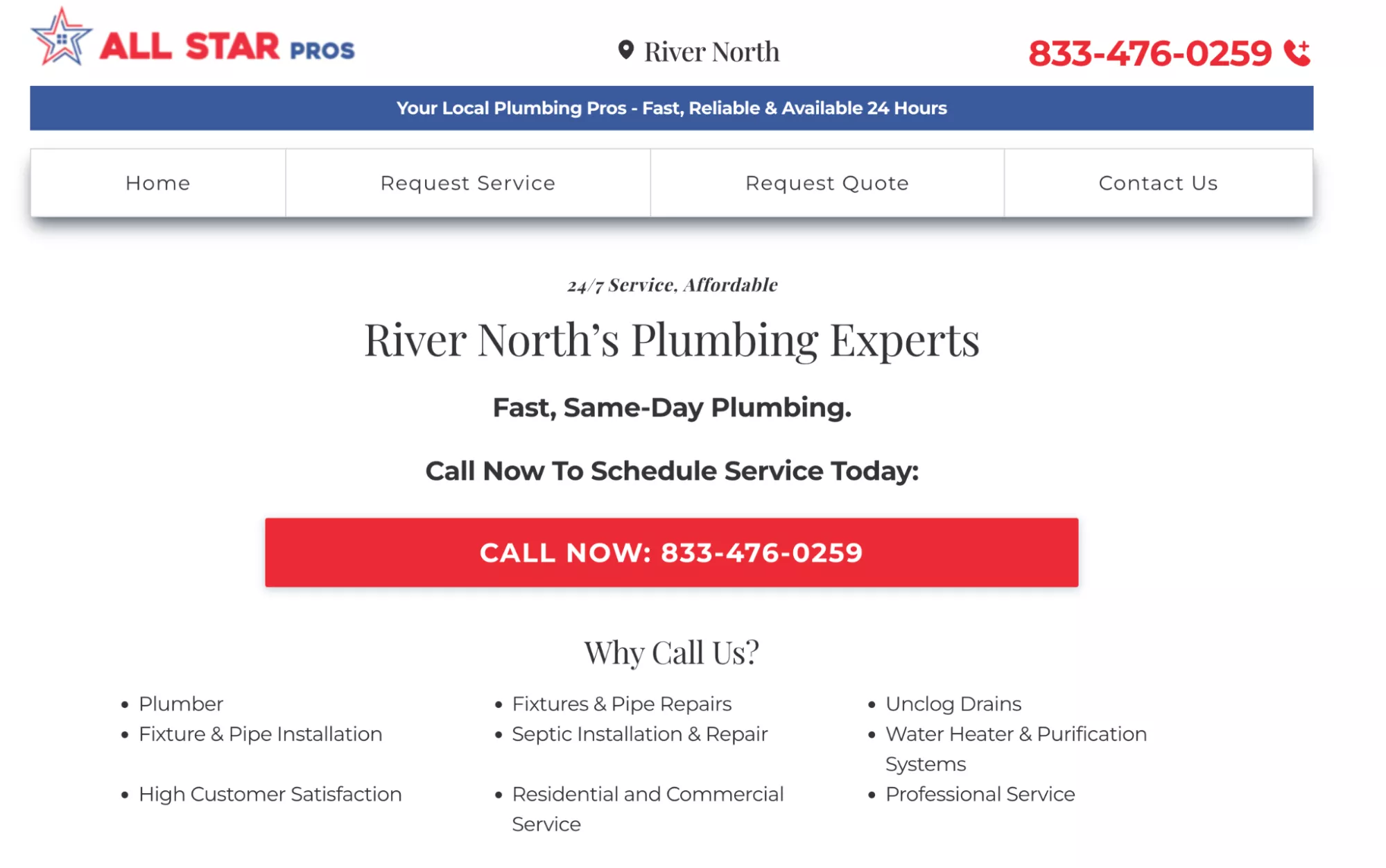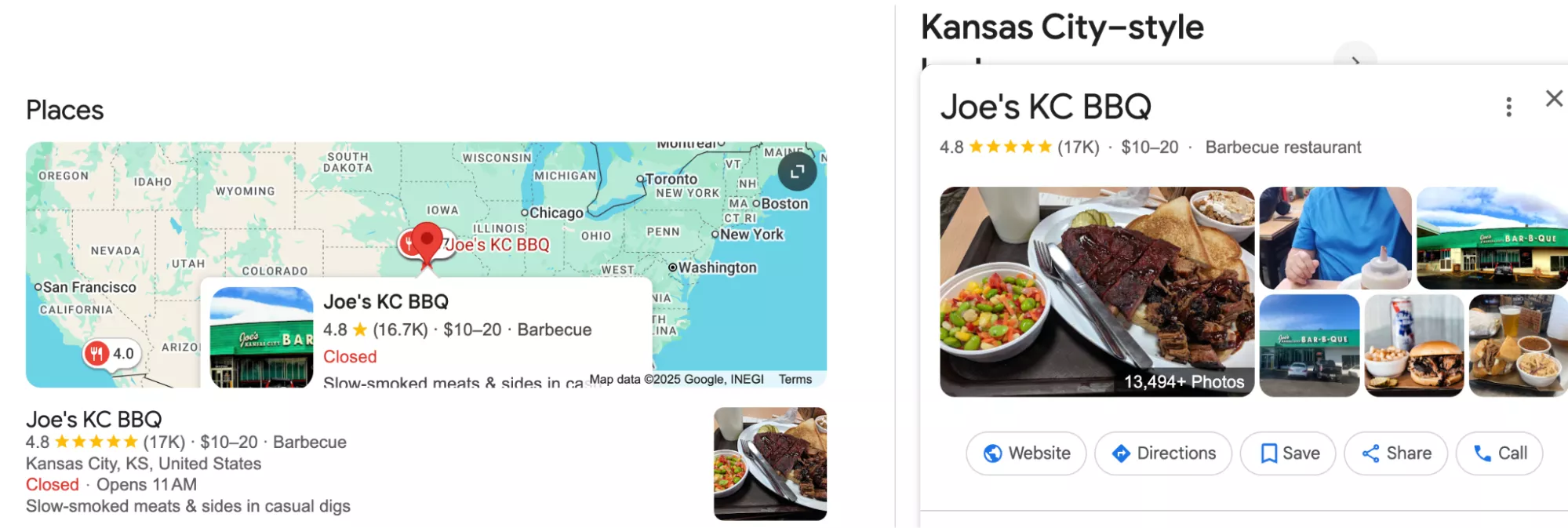Local search engine optimization (SEO) is like turning on a spotlight in your neighborhood — it ensures that people can actually find your business exactly when they need it.
It helps you to become your own version of Batman: “the hero your city needs.” It is not about saving the whole world — just to make sure the people in Gotham know you’re there when trouble strikes.
In the world of local SEO, AI is like Robin to your Batman — a helpful guy indeed, but not the major hero.
In this article, I’ll show you how SEO for local results and AI can work together. It can drive business goals: give you more calls, more foot traffic, and more “I found you on Google” moments.
-
What Is Local SEO: Be the Hero Your City Needs
-
Why Local SEO Matters in the AI Era
-
The Stakes for Small Businesses
-
What’s Changing in Local SEO in 2025
-
Local SEO + AI: Your New Dynamic Duo
-
How Does Local SEO Work in Practice
-
Step-By-Step Guide for a Successful Local SEO Strategy
-
Best Practices Every Small Business Should Follow
-
How to Measure Success
-
FAQ
What Is Local SEO: Be the Hero Your City Needs
SEO (Search Engine Optimization) helps to show your business on Google when someone somewhere searches. Local SEO is created to show your business to your neighbours nearby.
For example, if you run a small dental office in Dallas, you don’t need ranking #1 in the USA for “dentist”. In most cases, you can’t afford it.
It’s enough to be the first choice when someone in Dallas asks, “best dentist near me”. You’ll have relevant clients who will come back to you again and again.
It’s like the old Yellow Pages, but smarter and online. The Yellow Pages listed your address and phone number only. SEO for local business helps to provide a complete package: your work hours, photos, menu, customer reviews, etc.
Why Local SEO Matters in the AI Era
AI helps search engines a lot nowadays, and it loves local SEO. That means three things you definitely want to know.
-
Local SEO feeds into Google’s Knowledge Graph. It’s the web of info Google uses to understand the world. You need to share information about your business on your website, social media, and other blogs. You need to update the Google Business Profile.
In this situation, AI will have enough information to think you’re legit. And when it answers someone’s question in Google search results, your business will pop up first.
-
AI shows reviews directly. It analyzes all reviews and shares the common result of what people think about your service. For example, if you’re a plumber in Chicago, AI can summon “Customers praise the timely arrival and efficiency of their licensed plumbers” or “Is known for its quick emergency response time, though some note higher prices.”
-
Local results dominate AI searches. Pull out your phone and search “coffee near me.” You can see a map with three businesses — called the Google Local Pack. According to RedlocalSEO, up to 44% of clicks go to those three businesses. So, they have more calls and more foot traffic. And they definitely have a lot of information about themselves online.
Read more about AI influence on SEO in our article about GEO (Generative Engine Optimization).
The Stakes for Small Businesses
Small guys don’t have a Starbucks budget or a Harry Styles marketing team. Lucky for them, a lot of people nearby are actually looking for what they offer.
-
A 2024 BrightLocal study showed that more than 78% of people use the internet more than once a week to find information about local businesses.
-
According to Think With Google, nearly 30% of mobile searches are location-based.
That means little players need to show up in local search results to survive and prosper. The next customer is googling where to eat, shop, or get help right now — and they don’t want to go far away. Even care providers such as dental clinics need to adopt local SEO approaches as a part of the healthcare marketing strategy to stand out.
Now, users appreciate cozy family places where people know their names and can share the latest gossip. This is a great opportunity for retention because people build a connection with the brand and will choose you for years to come.
What’s Changing in Local SEO in 2025
SEO is like fashion, and Google is like Miranda Priestly from The Devil Wears Prada. First, we are all a little bit scared of them. Second, they set the trends, so we must listen and obey.
Trend 1: Zero-Click Results
That's all so much easier for your customers now, so they can find answers even without visiting a website.
For example, when I searched, “Is Joe’s Diner open right now?”, I saw directly: “Yes, it is currently open, serving breakfast and lunch from 7 AM to 2 PM daily.” I have now found the place where I can get my morning avocado toast. And I didn't even have to lift a finger!
Trend 2: Search Queries Are More Conversational
People often have a hard time taking their eyes off Love Island long enough to type out phrases like "best lawyer in Dallas." Instead, they prefer to save precious minutes by asking voice assistants questions like: “Hey Siri, who is the best divorce lawyer in Dallas who offers free consultations?”
Siri, Alexa, and Google Assistant have become so advanced that they can understand natural language. That means that you need to include answers to colloquial questions in your content. Then AI will use it — and at the same time promote your business in Google search results.
Trend 3: Local Packs Evolve
Now Google’s Local Pack can show AI-generated blurbs like, “Fresh baked, good variety, and reasonably priced.” It’s basically like having a tiny robot hype-person shouting your best qualities to everyone nearby.
Local SEO + AI: Your New Dynamic Duo
AI can't replace the core moves of local SEO; it's not smart enough. But it can handle the time-consuming stuff you don’t want to do.
| Task | How AI Helps | Local SEO Tools |
| Writing Content | Let AI write the first draft of the article or announcement, and then add some personality — the one thing robots don’t have yet. | |
| Suggesting Local Keywords | AI can spy on what people are searching for. Then it hands you the best phrases you can use for your SEO strategy. | |
| Improving Reviews and Feedback | Have AI monitor customer reviews and flag those that need attention. However, respond to them yourself; people can always tell if a response was written by a machine. | |
| Analyzing Competitors |
AI tools can scan other businesses’ websites and local listings to find their weak spots. You’ll know how to steal their spotlight. |
|
| Answering Customer Questions | Unlike humans, chatbots and AI assistants don’t need to rest, so they can answer questions at any time of day or night. You, however, still need your beauty sleep. |
How Does Local SEO Work in Practice
To show just how powerful local SEO can be, let me share a real-life case study.
Netpeak specialists worked with a small medical clinic in Florida that dreamed of helping more patients. Their site was slow, and Google didn't recognize it as a trusted resource. And when someone searched for a "family doctor near me", the clinic's website was nowhere to be found.
And So Our Journey Began
In just six months, we rolled out a local SEO strategy in three important areas.
-
Website Optimization. First, we gave the clinic’s website a makeover. It became faster, friendly to every device, and easy to explore.
-
Local SEO Keyword Research. Instead of chasing the overcrowded “medical clinic” term, we discovered what people were truly asking Google: “family doctor in Florida,” “urgent care near Parkland,” etc.
-
Link Building and Local Authority. Finally, we formed alliances with trusted neighbors and local guides. These connections showed Google that the clinic was part of the community.
The Happy Ending
-
Each month, 40% more people visited the clinic’s website.
-
There were 63% more clicks, which brought patients calling to book appointments and find their way to the clinic.
If you want to see your business in local search results, call upon the Local SEO Services. We can help guide nearby customers straight to your door.
Step-By-Step Guide for a Successful Local SEO Strategy
I hope you now understand the importance of local SEO. Now it's time to put this information to use.
Step 1: Work on Your Google Business Profile
Google uses this profile for everything: Maps, the Local Pack, AI summaries, and more. So, it's important not to mess it up!
-
Go to your Google Business Profile. If Google already has a profile for your business, click “Claim this business.” If there isn’t a profile yet, click “Add your business”.
-
Google needs to make sure you’re the rightful owner. Verify a profile by postcard, phone, email, or instant verification if available.
-
Choose the primary category correctly. It should describe your main service.
-
Make it pretty: add 10–20 photos of the exterior, food, team, your grandma, etc.
-
Set up Questions & Answers. Think about which questions you don't want to answer on the phone a hundred times. So it’s better to write them down (five to ten is a good place to start).
Step 2: Make NAP (Name, Address, Phone) Consistent
Google likes it when your info is the same everywhere. So check your business name, address, and phone on your website, social pages, Yelp, Yellow Pages, and anywhere else you’re listed.
For example, Google’s simple mind doesn't like it when there's a mismatch between (555) 123-4567 and 555-123-4567. It may seem trivial, because who cares, but Google really does. So, pick one format and stick to it everywhere.
To do it right, start with a manual check: search your business name + city, and check the top 10 directories. Then (if you’re Richie Rich), use paid local SEO tools.
Step 3: Discover the Right Local Keywords
Google shows your business at the right moment only if you play by its rules. So you need to program your content with the right keywords.
Start with the obvious: “[Service] near me”, “[Service] in {city}”, “Best [service] {neighborhood}”. Then add keywords by intent:
-
Transactional (ready to act): “emergency plumber near me,” “book dentist appointment {city}”
-
Informational (good for blogs and content): “how to stop a running toilet {city}”
-
Navigational (finding you directly): “{business name} hours”
Step 4: Build Pages Search Engines Love to Show Off
Create some dedicated service pages that directly answer local searches. For example, “River North’s Plumbing Experts”. I love this big red phone number! It should be effective..
If you serve multiple areas, give each neighborhood and city its own page.
Step 5: Review Strategy
Reviews are like public love letters (or not-so-love letters). Either way, search engines pay attention.
Don’t be shy! Ask for a review on receipts or email after service. Include a direct link to your Google review form (make it super easy).
And reply to every review — the nice ones and the grumpy ones. No reply is like leaving someone hanging after a high-five. Awkward.
Step 6: Get Seen on Local Citations & Directories
Get listed on the classics — Yelp, Bing Places, Apple Maps, Facebook, YellowPages, etc. People still use these platforms, and they will continue to do so indefinitely.
Step 7: Local Content That Actually Gets Read
Local content proves to Google that you’re part of the neighborhood. So be helpful to the people around you:
-
Answer local questions in your articles: “Where to park near [local landmark]?” or “How does my son survive his first teeth cleaning in [city]?”
-
Use question-style headings: H2s like “How to Find a Dentist on the Weekend?” work because they sound like something your customer would literally type into Google.
Step 8: Local Link Building
You need to find friendly businesses and media around to have quality backlinks.
First, send press releases about your news to local media: grand openings, community events, charity drives, etc. Local papers and blogs don't have much to write about, so they'll be happy to receive them.
Then, team up with neighbors. If you’re a dentist, cross-promote with an orthodontist. You have a common audience, but you’re not rivals to each other.
If you need help with link building for your business, know that we have extensive experience in this area. Just let us know!
Best Practices Every Small Business Should Follow
Local SEO is an ongoing habit, like keeping your storefront clean. Here’s how it plays out in the real world:
-
Add some personality to your Google Posts. People can ignore dry updates on Google Business Profile. But it’s hard to ignore stories like: "Our chef burned the first pumpkin pie of the season — oops! Come, taste the second one — it's great!"
-
Use the most attractive photos. A Joe’s KC BBQ joint did this with their smoked ribs — guess who popped up in Google’s Local Pack when locals typed “best ribs near me”? Exactly.
-
Check Local Keywords. Tourists in New Orleans during Mardi Gras are searching for “king cake.” A bakery that optimized for that keyword saw orders spike like confetti at a parade.
How to Measure Success
All the theoretical gibberish we talked about earlier has one clear practical goal — to bring you real-life customers. Here’s how to know for sure that local SEO works:
-
Your phone rings more often from Google or Google Maps.
-
More people tap “Get directions” in Google Maps and walk into your business.
-
You have more reviews and more stars.
-
Customers tell you, “I found you on Google.”
You can use Google Business Profile (GBP) Insights to see calls, clicks, and directions, and Google Analytics (GA4) to track traffic, form fills, and bookings.
No experience with such tools? No problem! We share insights in our article on SEO analytics.
FAQ
What is Local SEO?
Local SEO is the process of making your business visible to people nearby when they search online.
Why is Local SEO important?
Because most customers start their journey online, even if they buy in person. If you don’t show up, they’ll go to a competitor who does.
What’s the difference between Local SEO and Global SEO?
Local SEO focuses on customers in your immediate area (like “plumber Dallas”), while global SEO aims to reach a wide audience everywhere (like a software company serving customers nationwide).
How long does Local SEO take to work?
It’s not overnight. Most businesses see noticeable results in 3–6 months, but improvements can start showing up within weeks if you keep your profile active.
Do I need a website for Local SEO?
A website helps a lot, but even without one, you can rank in Google Maps through a well-optimized Google Business Profile.
How much does Local SEO cost?
It depends. Many small businesses start free by managing their Google Business Profile themselves. Paid tools or agencies can speed things up, but aren’t required to get results.
Related Articles
SEO for Moving Companies: Boston Edition
Local SEO is a highly effective tool to make your moving company known in Boston and attract more quality website traffic. Read how SEO can help you outgrow competitors and top the Google SERP chart in 2026!
Word-of-Mouth Won’t Save Your Moving Company. Here’s How to Actually Streamline Leads [Research & Industry Insider Tips]
Relying on referrals isn’t enough to grow your moving company. Discover proven strategies to diversify lead sources and streamline client acquisition with insider tips.
Electrician Digital Marketing: 11 Tips to Get Your Business on Top
Digital marketing for electricians can be tricky, but it is an indispensable tool for brand visibility. Discover how to leverage digital marketing to get more customers for your electrical company in 2026!

